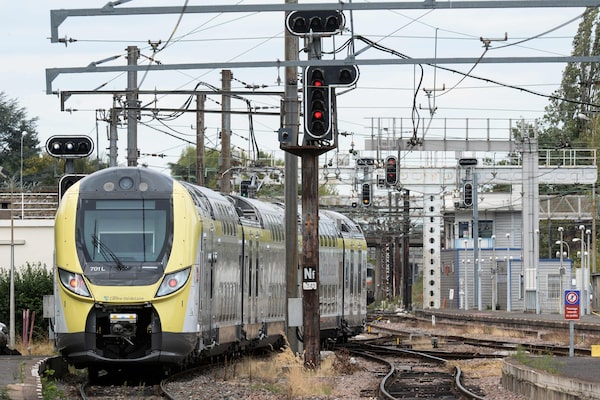
This photo taken on Aug. 25, 2020, shows the first Omneo Premium Regio 2N train in Orleans, central France.JEAN-FRANCOIS MONIER/AFP/Getty Images
Bombardier Inc. will sell its rail business to French train giant Alstom SA for US$350-million less than originally planned, as the deal moves ahead to an expected close by next spring.
Bombardier announced Wednesday that it has signed a definitive agreement for the sale of the rail unit to Alstom, after a memorandum of understanding between the two companies earlier this year.
The price is €7.15-billion (US$8.4-billion) including debt, roughly €300-million (US$350-million) less than the original deal, Bombardier said in a statement. The lower price is offset by a more favourable exchange rate between European and U.S. currencies, the company said.
Bombardier shares climbed 6 per cent to close at 44 cents in Toronto Wednesday. Its bonds also rose.
“The definitive agreement is a key plus for Bombardier given that investors were worried that Alstom would walk from the deal," Cowen analyst Cai von Rumohr said in a research note. The agreement reduces the urgency for Bombardier to make any major concessions on another planned divestiture of its a plane parts-making business to Spirit AeroSystems, he said.
The sale to Alstom amounts to a crucial transaction for Bombardier, which intends to use the proceeds to reduce debt and shift to become a pure-play manufacturer of private business jets. The transaction will also mark the end of a multiyear sale of assets that began under former CEO Alain Bellemare.
The company now expects net proceeds of about US$4-billion from the sale, down from a range of US$4.2-billion to US$4.5-billion. That amount includes €500-million (US$590-million) in Alstom stock.
Alstom said last month that it remained convinced of the strong strategic rationale for the takeover but signalled it might push for a lower price after the Canadian manufacturer reported a second-quarter loss pinned on a major writedown at the rail unit. Bombardier’s quarterly report “points to unexpected and negative developments” in its train business, especially compared with the information available before the announcement of the takeover in February, Paris-based Alstom said then.
“There was concern that the price adjustment could have been considerably larger,” Veritas Investment Research analyst Dan Fong said. “But on balance, the net proceeds from the new deal isn’t far off from the original terms, and it lifts the cloud of uncertainty from Alstom’s comments last month.”
The euro’s gain against the U.S. dollar over the past several months is worth an extra US$400-million to Bombardier in the deal, Mr. Fong calculated. The company has locked in the current exchange rate for when it gets paid, he said. On the downside, the manufacturer has built in a buffer of US$200-million to account for additional cash shortfalls in the rail business, which will reduce the net proceeds slightly.
Alstom and Bombardier have received approval for the takeover from regulators in Europe, where the two rail businesses are based. They still have to get clearance from regulators in a few other countries, including Canada, the United States and China, as well as backing from Alstom shareholders in a vote expected in October.
The transaction is now expected to close in the first quarter of 2021, Bombardier said. The deal with Spirit remains on track to close this fall, Bombardier spokesman Olivier Marcil said.
Bombardier is one of the world’s largest manufacturers of rail equipment and continues to receive new orders, strengthening a US$33.7-billion backlog. But the business has been hamstrung in recent years by problems on several technically complex contracts, including deals with Germany’s Deutsche Bahn and London Overground, that have resulted in delivery delays and financial penalties.
Montreal-based Bombardier took a charge of US$435-million on the train business in its latest quarter, which contributed to a net loss of US$223-million, or 13 cents a share. The charge was related to what the company called “incremental engineering, certification and retrofit costs” on several nearly complete projects, mainly in Britain and Germany.
Canadian pension fund Caisse de dépôt et placement du Québec, which holds about 30 per cent of Bombardier’s rail business, will convert its position into shares of Alstom under the planned takeover. Caisse will become Alstom’s largest shareholder, with about 18 per cent of the company.